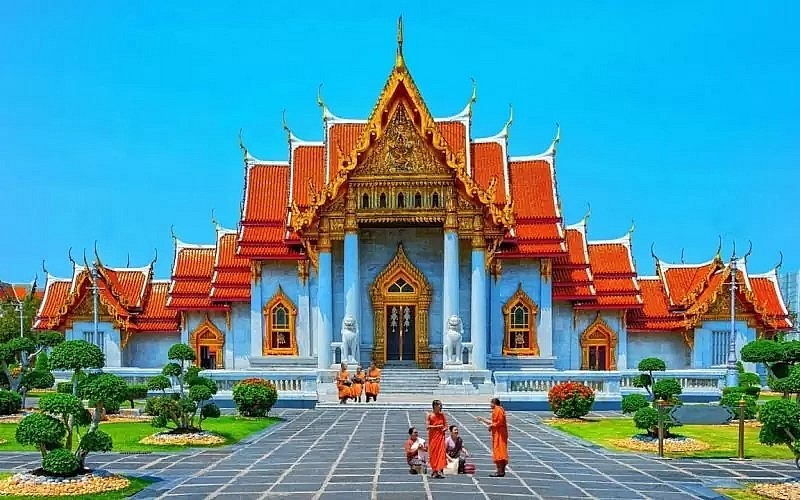Buddhism in the West: Drawing Tradition, Science, and Identity from Asia
 |
From the pioneering collaborations between prominent Buddhist masters like Mingyur Rinpoche and neuroscientists to the groundbreaking work of Matthieu Ricard, whose happiness became a subject of scientific study, Buddhism’s compatibility with science has been a central attraction in the West. His Holiness the Dalai Lama’s dialogues with scientists and the Mind & Life Institute he founded stand as enduring symbols of this fruitful partnership.
However, Western Buddhism’s journey hasn’t been without its controversies and internal debates. The roots of this Westernized form of Buddhism can be traced back to anti-colonial intellectuals in South and Southeast Asia in the early 20th century, who saw common cause in challenging Christian influences. The subsequent cross-pollination between Asian and Western cultures resulted in a transnational form of Buddhism that sought to balance social engagement with personal introspection and sought validation from scientific scrutiny.
One hallmark of Western Buddhism has been its diversity. It ranges from those who embrace traditional practices and moral obligations, like Bhikkhu Bodhi, to others who, like Stephen Batchelor, argue for Buddhism’s detachment from historical context and philosophical underpinnings. In between, groups such as Plum Village have blended elements of traditional Buddhism with modern lifestyles.
Yet, amid this diversity, questions have arisen about representation, as Western Buddhism often appeared dominated by white faces. Scott Mitchell’s work has shed light on the overlooked contributions of Asian Buddhists in shaping the course of Western Buddhism.
Today, Western Buddhism faces philosophical challenges and internal divisions. It grapples with issues of spiritual materialism, ethical misconduct by revered teachers, and a generational decline in religious belief. In a world characterized by individualism and social media, the once-pervasive idea that Buddhism is a way of life, not a religion, is facing increasing skepticism.
One intriguing development in Western Buddhism is the emergence of “Dark Zen,” a movement that resonates with libertarian tech entrepreneurs and right-wing nationalists. This movement seeks to strip Buddhism of its cultural trappings and aligns with authoritarian strains found in parts of Asia. In contrast, neo-traditionalism, as observed by scholars like Heinz Berchert, blends a return to tradition with progressive ideas, championing environmentalism, gender equality, and anti-nationalism.
Neo-traditionalism holds together seemingly incongruous beliefs, reflecting the nuanced nature of Buddhism’s role in different societies. While some Buddhists in Asia advocate for national laws based on Dharma, they also value diversity, illustrating Buddhism’s adaptability.
In the United States, Western Buddhism has the opportunity to navigate these tensions and forge a more honest and respectful identity. By becoming an integral part of society and embracing both radicalism and reformism as complementary forces, Western Buddhism can stay true to its roots without regressing. An example of this is the engagement of Australian Buddhists, like Ven. Mettaji, in civic issues such as Indigenous representation in the government.
Many Buddhist teachers in Asia appreciate the reforming tendencies of Western Buddhism. As the global Buddhist population faces demographic challenges, a clear articulation of Buddhism’s timeless truths, coupled with active engagement in civic life, becomes essential for revitalizing not only Western Buddhism but also the global sasana.
In a world undergoing profound changes, Western Buddhism continues to evolve, confronting its inner contradictions and adapting to the times. Its journey is a testament to the enduring appeal of Buddhist wisdom and the potential for spiritual traditions to find relevance in an ever-changing world.
Recommended
 World
World
India strikes back at terrorists with Operation Sindoor
 World
World
India sending Holy Relics of Lord Buddha to Vietnam a special gesture, has generated tremendous spiritual faith: Kiren Rijiju
 World
World
Why the India-US Sonobuoy Co-Production Agreement Matters
 World
World
Vietnam’s 50-year Reunification Celebration Garners Argentine Press’s Attention
Popular article
 World
World
"Will continue offering our full support to Indian govt": US FBI Director after Pahalgam attack
 World
World
"Great Leader": JD Vance Lauds PM Modi During His India Visit
 World
World
Trump’s Tariff Pause: A Strategic Move from “The Art of the Deal”?
 World
World



